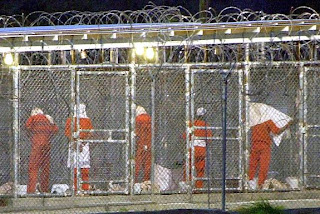
The United States of America lived up to its promise as a nation that promotes human rights and justice under democratic rule yesterday.
The Supreme Court got it right when they ruled that foreign detainees at Guantanamo Bay, Cuba have a right to something at least resembling habeas corpus. The White House under George Bush has repeatedly thumbed its nose at any semblance of justice as it follows its own brand of Machiavellian principles. While it has allowed a military tribunal to oversee the system, Justice Anthony Kennedy (above), writing the majority opinion, said that the military's "review process is, on its face, an inadequate substitute for habeas corpus." Justice Kennedy writes.
Many of the critics to the ruling will argue that alien "enemies" do not have any Constitutional protection. This ruling disagrees. But it does so while stating explicitly that it is concerned with the just treatment of prisoners, and not with a strict application of U.S. citizens' rights toward foreign prisoners. "We do not hold that an adequate substitute must duplicate [the federal habeas law] in all respects." Kennedy admits in his response to the dissenting opinion, that there is
 no precedent for their application of constitutional principles to foreign detainees, but denies that this is a "barrier" to the decision.
no precedent for their application of constitutional principles to foreign detainees, but denies that this is a "barrier" to the decision.That there is something more to this ruling than what is at stake in this one case shines through in the most popular quote from Kennedy's written opinion: "The laws and Constitution are designed to survive, and remain in force, in extraordinary times."
Importantly, Kennedy writes that "Liberty and security can be reconciled; and in our system they are reconciled within the framework of the law."
The impact of those two statements in combination reach far beyond the Guantanamo case alone. The Court is saying what many of us have believed for years--that the Bush Administration cannot dismiss the rule of law under the pretense of the very real dangers presented by terrorism. That would, presumably, apply to curtailment of the civil liberties of U.S. citizens as well.
Many of our fellow Americans will resent and ridicule this decision as a liberal abuse of the Court's powers. In fact, Justice Scalia and his fellow dissenters lead the way in this interpretation of the decision, which only narrowly passed at 5-4. We live in a very divided country. The conservative amongst us seem to want to put 'survival' at the top of their list of values. From the survivalist perspective, they justify actions that are not fitting for a democratic nation that supports basic human rights. But hasn't this always been the case in the long history of human affairs? The question in ethics is often about doing what is right and just as opposed to what is merely expedient. I am personally ashamed of my fellow countrymen whose consciences are not awake enough to remind them of this point. Nearly every atrocity perpetrated by dictators around the world has been done under the name of this expediency. It is against this arbitrariness that the rule of democratic rule has risen, and we must not forget that.
The United States should be a beacon of hope for the world. It should not be feared as an enemy of the rule of law.
Good articles: Congress's Guantanamo Burden
by Benjamin Wittes, and A Victory for the Rule of Law by Eugene Robinson. I think Newsweek gets it right with their title, Overplaying its Hand, by Stuart Taylor, Jr.
No comments:
Post a Comment